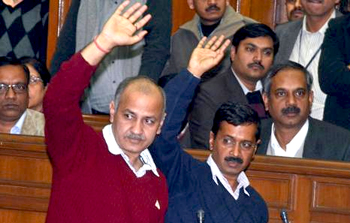 New Delhi, Feb 15: Delhi Chief Minister Arvind Kejriwal’s resignation, with all the sound and fury, would have been surprising if it did not happen. When, in December 2013, the Aam Aadmi Party formed a government in Delhi, it had a single objective in mind — to pass the Jan Lokpal Bill failing which to bow out of office as a martyr punished for taking on the corrupt. The script has played out almost perfectly.
New Delhi, Feb 15: Delhi Chief Minister Arvind Kejriwal’s resignation, with all the sound and fury, would have been surprising if it did not happen. When, in December 2013, the Aam Aadmi Party formed a government in Delhi, it had a single objective in mind — to pass the Jan Lokpal Bill failing which to bow out of office as a martyr punished for taking on the corrupt. The script has played out almost perfectly.
Mr. Kejriwal was bound by his own past to make the passage of the Bill non-negotiable. Indeed, the anti-corruption law defines the AAP, it is the reason why the party was able to make the impossible transition from a political greenhorn to a party in power.
The Jan Lokpal Bill was the centrepiece of the 2011-2012 Anna Hazare movement. To those who thronged the fast venues of Anna, the specific clauses in the legislation — which many experts saw as draconian with the Lokpal himself potentially turning into a Frankenstein’s monster — were of no concern. As Mr. Kejriwal said in a 2011 interview: “See, people did not understand the details of the JLB. They simply saw it as a dawai [medicine] for corruption.”
The larger symbolism of the Jan Lokpal Bill is why Mr. Kejriwal took on the might of the Centre and Delhi’s Lieutenant-Governor on the constitutional validity of its introduction and passage in the Assembly. There was always going to be two views on this given that the Congress was in the saddle at the Centre, and a different version of the Lokpal Bill had recently been passed by Parliament. The Congress could obviously not support the AAP government’s Jan Lokpal Bill and the Lokpal Bill passed by Parliament for which credit was given to Rahul Gandhi.
In the event, the Jan Lokpal Bill got blocked right at the stage of introduction with the Union Home Ministry insisting upon prior permission from the Lt. Governor. Mr. Kejriwal contested this furiously: He quoted experts who made the opposite case, he petitioned the Lt. Governor and argued that if the Delhi government was not going to be allowed to pass even a Bill, it made no sense for it to exist. With the Congress and the Bharatiya Janata Party teaming up to vote against the Bill’s introduction, the State government’s fate was sealed.
Whichever way the Bill went, Mr. Kejriwal was certain to have claimed it as his victory. Indeed, when initially it seemed as if the Delhi government had managed to introduce the Bill, there were jubilant shouts of “victory” from the crowds of AAP volunteers gathered outside the Assembly.
Mr. Kejriwal’s exit line predictably skewered the Congress and the BJP. “The two corrupt parties have got together to defeat me because they were scared I was going after Mukesh Ambani. They could not afford for me to expose the nexus.”
High on drama
The AAP government’s short life was high on drama; in less than two months it courted more controversy than governments would in a year. Mr. Kejriwal and his Ministers probably overdid the histrionics. And yet, few would dispute that on corruption, the AAP went where none dared to go. The FIR against Mr. Ambani — and the deafening silence of the other parties l’affaire K-G Basin — says as much.
Part II of the script will see the AAP take the message to the country as a whole — and set itself as the gold standard for probity and honesty.





Comments
Add new comment